- Home
- Elizabeth Gaskell
The life of Charlotte Brontë Page 16
The life of Charlotte Brontë Read online
Page 16
This is a specimen of the strong character not seldom manifested by the Yorkshire clergy of the Established Church. Mr. Roberson was a friend of Charlotte Brontë’s father; lived within a couple of miles of Roe Head while she was at school there; and was deeply engaged in transactions, the memory of which was yet recent when she heard of them, and of the part which he had had in them. I may now say a little on the character of the Dissenting population immediately surrounding Roe Head; for the “Tory and clergyman’s daughter,” “taking interest in politics ever since she was five years old,” and holding frequent discussions with such of the girls as were Dissenters and Radicals, was sure to have made herself as much acquainted as she could with the condition of those to whom she was opposed in opinion.
The bulk of the population were Dissenters, principally Independents. In the village of Heckmondwike, at one end of which Roe Head is situated, there were two large chapels, belonging to that denomination, and one to the Methodists, all of which were well filled two or three times on a Sunday, besides having various prayer-meetings, fully attended, on week-days. The inhabitants were a chapel-going people, very critical about the doctrine of their sermons, tyrannical to their ministers, and violent Radicals in politics. A friend, well acquainted with the place when Charlotte Brontë was at school, has described some events which occurred then among them:—
“A scene, which took place at the Lower Chapel at Heckmondwike, will give you some idea of the people at that time. When a newly-married couple made their appearance at chapel, it was the custom to sing the Wedding Anthem, just after the last prayer, and as the congregation was quitting the chapel. The band of singers who performed this ceremony expected to have money given them, and often passed the following night in drinking; at least, so said the minister of the place; and he determined to put an end to this custom. In this he was supported by many members of the chapel and congregation; but so strong was the democratic element, that he met with the most violent opposition, and was often insulted when he went into the street. A bride was expected to make her first appearance, and the minister told the singers not to perform the anthem. On their declaring they would, he had the large pew which they usually occupied locked; they broke it open: from the pulpit he told the congregation that, instead of their singing a hymn, he would read a chapter. Hardly had he uttered the first word, before up rose the singers, headed by a tall, fierce-looking weaver, who gave out a hymn, and all sang it at the very top of their voices, aided by those of their friends who were in the chapel. Those who disapproved of the conduct of the singers, and sided with the minister, remained seated till the hymn was finished. Then he gave out the chapter again, read it, and preached. He was just about to conclude with prayer, when up started the singers and screamed forth another hymn. These disgraceful scenes were continued for many weeks, and so violent was the feeling, that the different parties could hardly keep from blows as they came through the chapel-yard. The minister, at last, left the place, and along with him went many of the most temperate and respectable part of the congregation, and the singers remained triumphant.
“I believe that there was such a violent contest respecting the choice of a pastor, about this time, in the upper chapel at Heckmondwike, that the Riot Act had to be read at a church-meeting.”
Certainly, the soi-disant Christians who forcibly ejected Mr. Redhead at Haworth, ten or twelve years before, held a very heathen brotherhood with the soi-disant Christians of Heckmondwike; though the one set might be called members of the Church of England, and the other Dissenters.
The letter from which I have taken the above extract relates throughout to the immediate neighbourhood of the place where Charlotte Brontë spent her school days, and describes things as they existed at that very time. The writer says,—“Having been accustomed to the respectful manners of the lower orders in the agricultural districts, I was, at first, much disgusted and somewhat alarmed at the great freedom displayed by the working classes of Heckmondwike and Gomersall to those in a station above them. The term ‘lass’ was as freely applied to any young lady, as the word ‘wench’ is in Lancashire. The extremely untidy appearance of the villages shocked me not a little, though I must do the housewives the justice to say that the cottages themselves were not dirty, and had an air of rough plenty about them (except when trade was bad), that I had not been accustomed to see in the farming districts. The heap of coals on one side of the house-door, and the brewing tubs on the other, and the frequent perfume of malt and hops as you walked along, proved that fire and “home-brewed” were to be found at almost every man’s hearth. Nor was hospitality, one of the main virtues of Yorkshire, wanting. Oat cake, cheese, and beer, were freely pressed upon the visitor.
“There used to be a yearly festival, half religious, half social, held at Heckmondwike, called ‘The Lecture.’ I fancy it had come down from the times of the Nonconformists. A sermon was preached by some stranger at the Lower Chapel, on a week day evening, and the next day two sermons in succession were delivered at the Upper Chapel. Of course, the service was a very long one, and as the time was June, and the weather often hot, it used to be regarded by myself and my companions as no pleasurable way of passing the morning. The rest of the day was spent in social enjoyment; great numbers of strangers flocked to the place; booths were erected for the sale of toys and gingerbread (a sort of ‘Holy Fair’); and the cottages having had a little extra paint and white-washing, assumed quite a holiday look.
“The village of Gomersall” (where Charlotte Brontë’s friend ‘Mary’ lived with her family), “which was a much prettier place than Heckmondwike, contained a strange-looking cottage, built of rough unhewn stones, many of them projecting considerably, with uncouth heads and grinning faces carved upon them; and upon a stone above the door was cut, in large letters, ‘SPITE HALL’ It was erected by a man in the village, opposite to the house of his enemy, who had just finished for himself a good house, commanding a beautiful view down the valley, which this hideous building quite shut out.”
Fearless—because this people were quite familiar to all of them—amidst such a population, lived and walked the gentle Miss Wooler’s eight or nine pupils. She herself was born and bred among this rough, strong, fierce set, and knew the depth of goodness and loyalty that lay beneath their wild manners and insubordinate ways. And the girls talked of the little world around them, as if it were the only world that was; and had their opinions and their parties, and their fierce discussions like their elders—possibly, their betters. And among them, beloved and respected by all, laughed at occasionally by a few, but always to her face—lived, for two years, the plain, short-sighted, oddly-dressed, studious little girl they called Charlotte Brontë.
CHAPTER VII.
Miss Brontë left Roe Head in 1832, having won the affectionate regard both of her teacher and her school-fellows, and having formed there the two fast friendships which lasted her whole life long; the one with “Mary,” who has not kept her letters; the other with “E.” who has kindly entrusted me with as much of her correspondence as she has preserved. In looking over the earlier portion, I am struck afresh by the absence of hope, which formed such a strong characteristic in Charlotte. At an age when girls, in general, look forward to an eternal duration of such feelings as they or their friends entertain, and can therefore see no hindrance to the fulfilment of any engagements dependent on the future state of the affections, she is surprised that E. keeps her promise to write. In after-life, I was painfully impressed with the fact, that Miss Brontë never dared to allow herself to look forward with hope; that she had no confidence in the future; and I thought, when I heard of the sorrowful years she had passed through, that it had been this pressure of grief which had crushed all buoyancy of expectation out of her. But it appears from the letters, that it must have been, so to speak, constitutional; or, perhaps, the deep pang of losing her two elder sisters combined with a permanent state of bodily weakness in producing her hopelessness. If her trust in God had
been less strong, she would have given way to unbounded anxiety, at many a period of her life. As it was, we shall see, she made a great and successful effort to leave “her times in His hands.”
After her return home, she employed herself in teaching her sisters, over whom she had had superior advantages. She writes thus, July 21st, 1832, of her course of life at the parsonage:—
“An account of one day is an account of all. In the morning, from nine o’clock till half-past twelve, I instruct my sisters, and draw; then we walk till dinner-time. After dinner I sew till tea-time, and after tea I either write, read, or do a little fancy work, or draw, as I please. Thus, in one delightful, though somewhat monotonous course, my life is passed. I have been only out twice to tea since I came home. We are expecting company this afternoon, and on Tuesday next we shall have all the female teachers of the Sunday-school to tea.”
It was about this time that Mr. Brontë provided his children with a teacher in drawing, who turned out to be a man of considerable talent, but very little principle. Although they never attained to anything like proficiency, they took great interest in acquiring this art; evidently, from an instinctive desire to express their powerful imaginations in visible forms. Charlotte told me, that, at this period of her life, drawing, and walking out with her sisters, formed the two great pleasures and relaxations of her day.
The three girls used to walk upwards towards the “purple-black” moors, the sweeping surface of which was broken by here and there a stone-quarry; and if they had strength and time to go far enough, they reached a waterfall, where the beck fell over some rocks into the “bottom.” They seldom went downwards through the village. They were shy of meeting even familiar faces, and were scrupulous about entering the house of the very poorest uninvited. They were steady teachers at the Sunday-school, a habit which Charlotte kept up very faithfully, even after she was left alone; but they never faced their kind voluntarily, and always preferred the solitude and freedom of the moors.
In the September of this year, Charlotte went to pay her first visit to her friend E. It took her into the neighbourhood of Roe Head, and brought her into pleasant contact with many of her old schoolfellows. After this visit, she and her friend seem to have agreed to correspond in French, for the sake of improvement in the language. But this improvement could not be great, when it could only amount to a greater familiarity with dictionary words, and when there was no one to explain to them that a verbal translation of English idioms hardly constituted French composition; but the effort was laudable, and of itself shows how willing they both were to carry on the education which they had begun under Miss Wooler. I will give an extract which, whatever may be thought of the language, is graphic enough, and presents us with a happy little family picture; the eldest sister returning home to the two younger, after a fortnight’s absence.
“J‘arrivait à Haworth en parfaite sauveté sans le moindre accident ou malheur. Mes petites soeurs couraient hors de la maison pour me rencontrer aussitôt que la voiture se fit voir, et elles m’embrassaient avec autant d’empressement, et de plaisir, comme si j’avais été absente pour plus d‘an. Mon Papa, ma Tante, et le monsieur dont mon frére avoit parlé, furent tous assembles dans le Salon, et en peu de temps je m’y rendis aussi. C‘est souvent l’ ordre du Ciel que quand on a perdu un plaisir il y en a un autre prêt à prendre sa place. Ainsi je venoit de partir de trés chérs amis, mais tout à l’heure je revins à des parens aussi chers et bons dans le moment. Même que vous me perdiez (ose-je croire que mon depart vous était un chagrin?) vous attendites l’ arrivée de votre frére, et de votre sœur. J‘ai donné a mes sœurs les pommes que vous leur envoyiez avec tant de bonté; elles disent qu’elles sont sur que Mademoiselle E. est trés aimable et bonne; l‘une et l’autre sont extremement impatientes de vous voir; j‘espére qu’en peu de mois elles auront ce plaisir.”1
But it was some time before the friends could meet, and meanwhile they agreed to correspond once a month. There were no events to chronicle in the Haworth letters. Quiet days, occupied in teaching, and feminine occupations in the house, did not present much to write about; and Charlotte was naturally driven to criticize books.
Of these there were many in different plights, and according to their plight, kept in different places. The well bound were ranged in the sanctuary of Mr. Brontë’s study; but the purchase of books was a necessary luxury to him, and as it was often a choice between binding an old one, or buying a new one, the familiar volume, which had been hungrily read by all the members of the family, was sometimes in such a condition that the bed-room shelf was considered its fitting place. Up and down the house, were to be found many standard works of a solid kind. Sir Walter Scott’s writings, Wordsworth’s and Southey’s poems2 were among the lighter literature; while, as having a character of their own—earnest, wild, and occasionally fanatical—may be named some of the books which came from the Branwell side of the family—from the Cornish followers of the saintly John Wesley—and which are touched on in the account of the works to which Caroline Helstone had access in “Shirley”:—“Some venerable Lady’s Magazines, that had once performed a voyage with their owner, and undergone a storm”—(possibly part of the relics of Mrs. Brontë’s possessions, contained in the ship wrecked on the coast of Cornwall)—“and whose pages were stained with salt water; some mad Methodist Magazines3 full of miracles and apparitions, and preternatural warnings, ominous dreams, and frenzied fanaticism; and the equally mad Letters of Mrs. Elizabeth Rowe from the Dead to the Living.”f
Mr. Brontë encouraged a taste for reading in his girls; and though Miss Branwell kept it in due bounds, by the variety of household occupations, in which she expected them not merely to take a part, but to become proficients, thereby occupying regularly a good portion of every day, they were allowed to get books from the circulating library at Keighley; and many a happy walk, up those long four miles must they have had burdened with some new book into which they peeped as they hurried home. Not that the books were what would generally be called new; in the beginning of 1833, the two friends seem almost simultaneously to have fallen upon “Kenilworth,”g and Charlotte writes as follows about it:—
“I am glad you like ‘Kenilworth;’ it is certainly more resembling a romance than a novel: in my opinion, one of the most interesting works that ever emanated from the great Sir Walter’s pen. Varney is certainly the personification of consummate villany; and in the delineation of his dark and profoundly artful mind, Scott exhibits a wonderful knowledge of human nature, as well as surprising skill in embodying his perceptions, so as to enable others to become participators in that knowledge.”
Commonplace as this extract may seem, it is note-worthy on two or three accounts: in the first place, instead of discussing the plot or story, she analyzes the character of Varney; and next, she, knowing nothing of the world, both from her youth and her isolated position, has yet been so accustomed to hear “human nature” distrusted, as to receive the notion of intense and artful villany without surprise.
What was formal and set in her way of writing to E. diminished as their personal acquaintance increased, and as each came to know the home of the other; so that small details concerning people and places had their interest and their significance. In the summer of 1833, she wrote to invite her friend to come and pay her a visit. “Aunt thought it would be better” (she says) “to defer it until about the middle of summer, as the winter, and even the spring seasons, are remarkably cold and bleak among our mountains.”
The first impression made on the visitor by the sisters of her school-friend was, that Emily was a tall, long-armed girl, more fully grown than her elder sister; extremely reserved in manner. I distinguish reserve from shyness, because I imagine shyness would please, if it knew how; whereas, reserve is indifferent whether it pleases or not. Anne, like her eldest sister, was shy; Emily was reserved.
Branwell was rather a handsome boy, with “tawny” hair, to use Miss Brontë’s phrase for a more obnoxious
colour. All were very clever, original, and utterly different to any people or family E. had ever seen before. But, on the whole, it was a happy visit to all parties. Charlotte says, in writing to E., just after her return home—“Were I to tell you of the impression you have made on every one here, you would accuse me of flattery. Papa and aunt are continually adducing you as an example for me to shape my actions and behaviour by. Emily and Anne say ‘they never saw any one they liked so well as you.’ And Tabby, whom you have absolutely fascinated, talks a great deal more nonsense about your ladyship than I care to repeat. It is now so dark that, notwithstanding the singular property of seeing in the night-time, which the young ladies at Roe Head used to attribute to me, I can scribble no longer.”
To a visitor at the parsonage, it was a great thing to have Tabby’s good word. She had a Yorkshire keenness of perception into character, and it was not everybody she liked.
Haworth is built with an utter disregard of all sanitary conditions: the great old churchyard lies above all the houses, and it is terrible to think how the very water-springs of the pumps below must be poisoned. But this winter of 1833-4 was particularly wet and rainy, and there were an unusual number of deaths in the village. A dreary season it was to the family in the parsonage: their usual walks obstructed by the spongy state of the moors—the passing and funeral bells so frequently tolling, and filling the heavy air with their mournful sound—and, when they were still, the “chip, chip” of the mason, as he cut the grave-stones in a shed close by. In many, living, as it were, in a churchyard—for the parsonage is surrounded by it on three sides—and with all the sights and sounds connected with the last offices to the dead things of every-day occurrence, the very familiarity would have bred indifference. But it was otherwise with Charlotte Brontë. One of her friends says:—“I have seen her turn pale and feel faint when, in Hartshead church, some one accidentally remarked that we were walking over graves.”

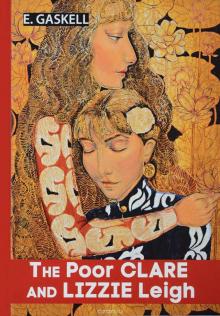 Lizzie Leigh
Lizzie Leigh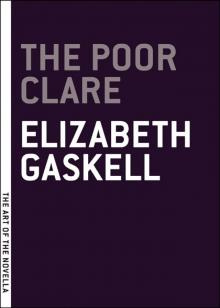 The Poor Clare
The Poor Clare Lois the Witch
Lois the Witch North and South
North and South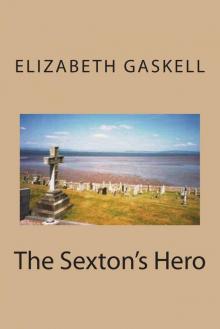 Sexton's Hero
Sexton's Hero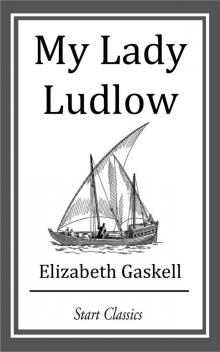 My Lady Ludlow
My Lady Ludlow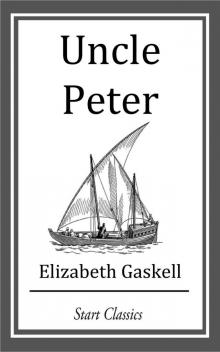 Uncle Peter
Uncle Peter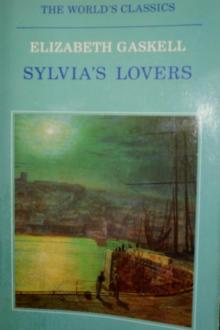 Sylvia's Lovers Elizabeth Cleghorn Gaskell
Sylvia's Lovers Elizabeth Cleghorn Gaskell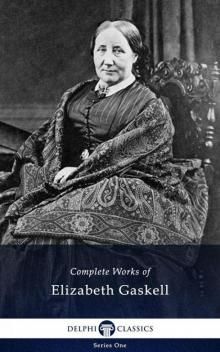 Delphi Complete Works of Elizabeth Gaskell
Delphi Complete Works of Elizabeth Gaskell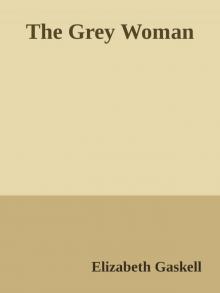 The Grey Woman
The Grey Woman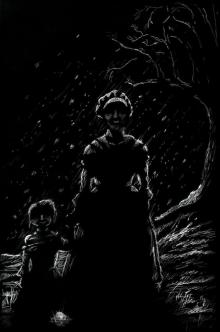 The Old Nurse's Story and Other Tales
The Old Nurse's Story and Other Tales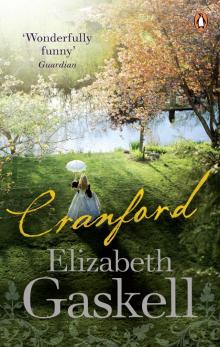 Cranford
Cranford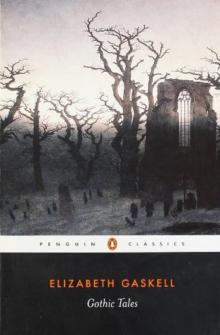 Gothic Tales
Gothic Tales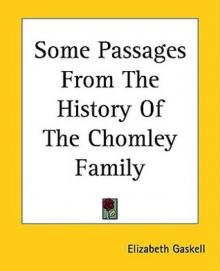 Some Passages From the History of the Chomley Family
Some Passages From the History of the Chomley Family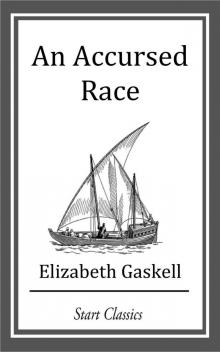 An Accursed Race
An Accursed Race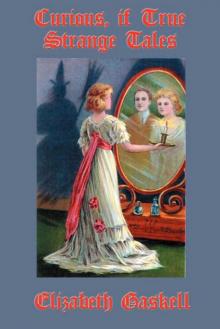 Curious, if True: Strange Tales Elizabeth Cleghorn Gaskell
Curious, if True: Strange Tales Elizabeth Cleghorn Gaskell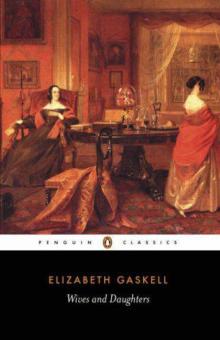 Wives and Daughters
Wives and Daughters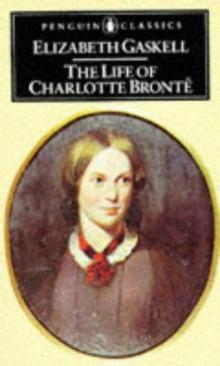 The life of Charlotte Brontë
The life of Charlotte Brontë